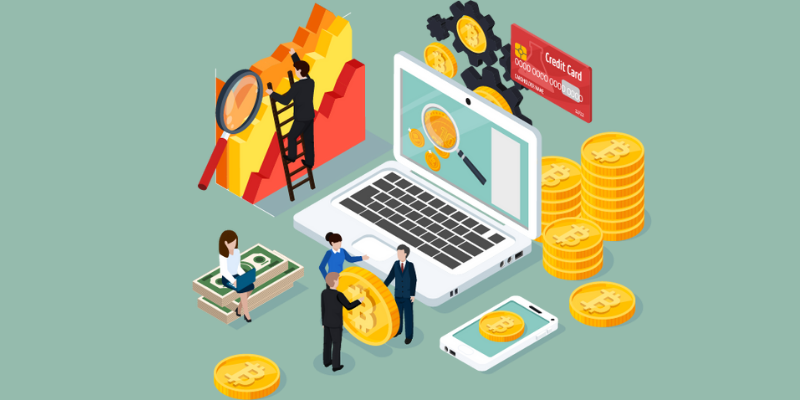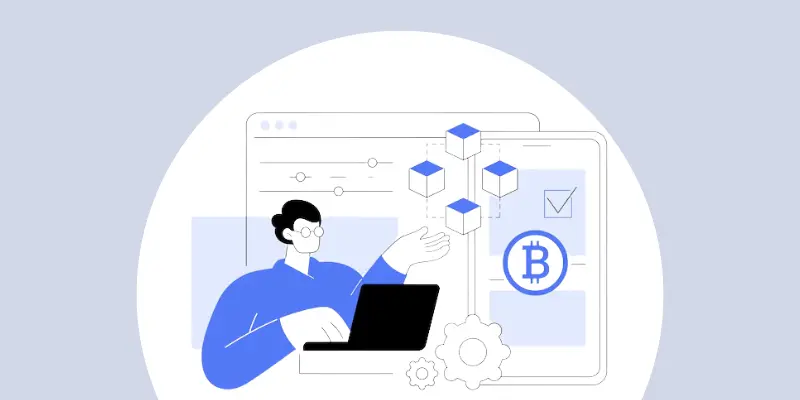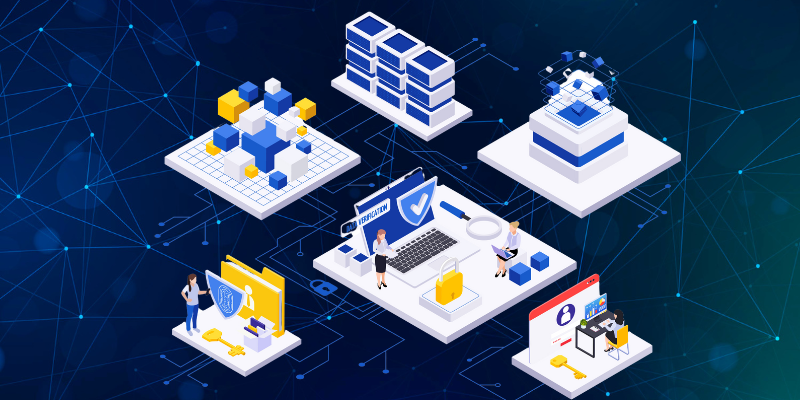Blockchain technology has rapidly emerged as a game-changer in the digital landscape, from cryptocurrency trading to supply chain management. Businesses looking to implement this revolutionary technology into their operations in order to increase security, transparency, and efficiency are increasingly turning towards blockchain mobile app development company for their needs.
One of the key considerations when embarking on a blockchain mobile app development journey is cost. Here, we explore this complex topic - "How Much Does Blockchain Mobile App Development Cost?" Blockchain mobile app development costs depend upon several key variables. These factors include project complexity, technology stack utilized, features and functionality required, skills of the development team, and whether a public or private blockchain should be created from scratch or integrated with existing platforms that may have already been set up. Businesses must understand all the costs involved with developing blockchain mobile apps to successfully navigate these complexities, from initial planning and design through deployment and maintenance costs. Each stage comes with its expenses that must be factored into budget decisions in order to prevent budget overruns. To do this successfully, businesses must gain a thorough knowledge of each stage's expenses.
Factors Affecting the Cost of Blockchain Mobile App Development
Understanding the factors affecting the cost of blockchain mobile app development is crucial for both businesses and developers. In this article, we'll delve into these critical components affecting this sector - providing insight into its complexities.
- Development Complexity
Complexity is often the key element in determining the cost for blockchain mobile apps, manifested in various forms:
- Blockchain Type: There are various blockchain platforms to select from, including Ethereum, Hyperledger, and Binance Smart Chain. Your choice will affect the development process; Ethereum may offer greater flexibility but may prove more challenging.
- Smart Contracts: Smart contracts - self-executing contracts written into code that automatically carry out their terms - can greatly improve the functionality of a blockchain mobile app, yet their development can be costly and complex.
- Data Storage: The amount and complexity of data to be stored on the Blockchain plays a pivotal role in determining costs; large volumes of information stored can become prohibitively costly to store on blockchains.
- Development Team
Involvement from an experienced development team is paramount when building blockchain apps, and their composition, expertise, and location all affect costs significantly.
- Development Team Composition: A well-rounded development team should include blockchain developers, mobile app developers, UI/UX designers, and quality assurance specialists - although hiring such an outfit may incur substantial expenses.
- Expertise: Experienced blockchain developers often command premium prices. Their knowledge of blockchain technologies and security protocols is essential for the app's success.
- Location: Location can play an enormous part in determining costs; developers in regions with higher living expenses tend to charge more for development services than their counterparts in lower-cost regions.
- Platform Compatibility
Verifying that the blockchain mobile app is compatible with various platforms is of utmost importance and can significantly lower development costs:
- iOS and Android Development: Producing apps for both platforms requires additional work as two different versions must be created for each.
- Cross-Platform Development: Utilizing cross-platform frameworks like React Native or Flutter can significantly lower development costs by enabling developers to write code that runs on both iOS and Android.
- User Interface and Experience (UI/UX)
To ensure the success of any blockchain mobile app, it’s user-friendly and visually appealing UI/UX must be user-centric and visually attractive. However, creating such an appealing design often incurs extra costs:
- UI/UX Designers: Employing experienced designers who can craft an appealing user experience is an additional expense.
- Prototyping and Testing: Employing prototypes as well as conducting user tests to refine your app design is another added expense that may drive up costs further.
- Customization: Tailoring an app's design specifically to meet the unique requirements and preferences of its target audience may be more expensive than using pre-built design templates.
- Security
Blockchain technology is widely renowned for its security features; however, that does not make blockchain apps immune from threats. Building an impenetrable app requires additional investment:
- Secure Smart Contracts: Protecting smart contracts against vulnerabilities is of utmost importance, as vulnerabilities may lead to severe losses. Auditing and testing smart contracts incur additional expenses.
- Encryption and Data Protection: Protecting user data and transactions is of utmost importance, yet adding robust encryption and security measures increases development costs.
- Penetration Testing: Undergoing regular penetration tests is key to detecting and rectifying potential security flaws within apps; however, these services come at a price tag.
- Compliance Requirements
Compliance with regulatory requirements is vitally important in industries like finance and healthcare, where failure to do so could incur additional expenses such as fines.
- Legal Consultation: Seeking legal advice is sometimes essential in order to comply with regulations specific to the industry in which an app operates.
- KYC/AML: Integrating KYC and Anti-Money Laundering (AML) features to meet regulatory compliance incurs development and operational costs, with some networks even requiring licenses or permission for their usage - this may incur hefty licensing costs as well.
- Licensing: Licensing can also be expensive depending on how your blockchain network operates; any additional fees might also incur costs for using certain blockchain networks.
- Scalability When Planning For Growth
Strategically planning for app scalability is vital in order to accommodate future growth. Ensuring it can handle increased users and transactions often means higher initial development costs:
- Architecture: Optimizing an app's architecture from its inception can be more expensive but can save money over time by eliminating major overhauls.
- Load Testing: Carrying out load testing can add another cost.
- Third-Party Integrations
Integration between blockchain apps and external services and APIs can be both time-consuming and costly:
- API Costs: Licensing or accessing third-party APIs often incur fees that need to be factored in.
- Custom Integrations: Constructing custom integrations can be more expensive than using existing APIs.
- Maintenance and Updates
Building a blockchain mobile app development requires ongoing maintenance and updates to stay competitive in the marketplace. Maintenance expenses related to keeping it current include:
- Bug Fixes: Bug-related expenses can become costly after launch.
- In-App Purchasing Solutions / Ad Hoc Support: Ongoing expenses related to addressing post-launch bugs/issues will add additional expenses as new releases emerge post-launch.
- Upgrades: Staying up-to-date with the latest blockchain technologies and security features is essential to its effectiveness.
- Security Patches: Regularly patching vulnerabilities to safeguard against emerging threats is also a necessity.
- Timeframe
The development timeframe can have an immense influence on the cost of blockchain mobile app development. Rush or expedited development often incurs additional expenses due to overtime pay, rapid development rates, and compromises in quality. 
Steps to Hire Remote Mobile App Developers for Blockchain Mobile App Development
Steps necessary to secure remote mobile app developers for blockchain mobile app development.
Step 1: Define Your Project Requirements
To get the best result out of the hiring process, it's vital that you clearly define your project requirements. This should include setting out the scope, objectives, features, and functionalities of the blockchain mobile app you intend to develop, as well as details like platform (Ethereum, Hyperledger, orDinance Smart Chain) and specific use case(s). Detailed requirements make finding remote mobile app developers much simpler.
Step 2: Draft a Job Description
After carefully outlining your project, the next step in hiring remote mobile app developers should be creating an in-depth job description. Your description should clearly outline all of the specific skills, qualifications, and experience you require of remote app developers - make sure to emphasize any blockchain expertise or technical proficiencies important to your project, as well as soft skills like communication, problem-solving, and teamwork that you value in potential candidates.
Step 3: Choose Appropriate Hiring Platforms
To recruit remote mobile app developers, a number of online platforms and resources may be useful in selecting potential developers. Popular options for hiring remote developers are job boards, freelancing websites, developer communities such as Upwork Total Freelancer GitHub, or social media like LinkedIn and Twitter - which may lead to potential candidates.
Step 4: Assess Portfolios and Resumes
Once your job description has been posted, applications from potential developers should start coming in. Review their portfolios, resumes, and cover letters carefully in order to assess their qualifications; look for developers with strong expertise working on Blockchain and mobile app projects as their past work may provide vital clues as to their skills and capabilities.
Step 5: Conduct Interviews
After narrowing your list of candidates to a select few, schedule interviews via remote interview tools (video call/voice call) in order to assess technical abilities, problem-solving capabilities, cultural fit with your organization, and behavioral questions to evaluate each candidate effectively.
Step 6: Verifying References
To verify the credibility and reliability of potential remote mobile app developers, contact their previous employers or clients and inquire about their work ethic, communication skills, and ability to meet project deadlines. This step is critical in verifying claims made during interviews or resume submission.
Step 7: Assess Cultural Fit
Cultural alignment is essential to successful remote collaboration within a Blockchain App Development Company. Even when a developer possesses all of the technical qualifications for your project, their ability to seamlessly blend in with your team and company culture remains of great significance. When choosing candidates for remote work roles it's essential they both possess both technical competence as well as values aligning with those of your organization.
Step 8: Evaluate Communication Skills
Effective communication is of utmost importance in remote work environments, from conveying ideas to giving project updates and seeking clarification when necessary to ensure a successful blockchain mobile app development project. As part of your interview process, pay particular attention to each candidate's communication abilities as well as how responsive they are when responding to inquiries about your blockchain mobile app development project.
Step 9: Assess Skills and Problem-Solving Abilities
To evaluate the technical capabilities of remote mobile app developers, try giving them a coding test or a small project to complete. This can provide valuable insight into their problem-solving skills, proficiency with blockchain technologies, and familiarity with real-world coding environments, as well as any contributions that they could bring to your project.
Step 10: Negotiate Terms and Rates
Once you've identified candidates that fit your criteria, the next step should be negotiating terms and rates with them. Outline clearly the terms of engagement, such as the duration of the project, milestones, and payment arrangements, before setting competitive rates that reflect developer abilities within your budget constraints.
Step 11: Draft and Sign a Contract
To formalize the agreement, create and sign a written contract outlining terms, responsibilities, and expectations from both sides of the partnership. Make sure it includes provisions regarding intellectual property rights, confidentiality, and dispute resolution; signing such a contract protects both your business interests as well as those of the remote developer.
Step 12: Onboarding and Integration
After hire remote mobile app developers, focus on an efficient onboarding process. Give them access to necessary tools, resources, and documentation and team members/project stakeholders as quickly as possible so they can become productive members of your remote team quickly. This ensures a faster onboarding experience!
Step 13: Establish Communication Channels
It is crucial that both your in-house team and remote developer can collaborate efficiently, so be sure to set up clear lines of communication using project management tools, instant messaging platforms, and video meetings regularly to keep everyone up to date and aware of project developments.
Step 14: Monitor Progress and Quality
Throughout the development process, closely track both progress and quality delivered by your remote mobile app developer. Regularly review their code, offer feedback, and address any issues quickly in order to maintain project alignment and quality. An ongoing feedback loop is vital in maintaining project alignment and quality.
Step 15: Maintain Open Communications
Communication is at the core of any successful collaboration with remote mobile app developers. Encourage them to ask questions, seek clarification when necessary, and update you on their progress regularly - this will foster an environment of trust and cooperation within your remote team. 
Conclusion
Understanding the factors affecting Blockchain Mobile App Development Cost is of equal importance for both businesses and developers. The costs associated with developing iOS or Android blockchain mobile apps can differ drastically based on certain key aspects. Factors to be considered in app development include its complexity, features, and functionalities needed, the technology stack used, and the experience of the development team.
Mobile app development companies in denver must strike a delicate balance when crafting secure blockchain mobile apps within budget constraints. Working with blockchain development communities or employing open-source frameworks may help lower expenses without impacting quality. As technology develops, blockchain mobile app development costs should become more accessible - providing businesses and entrepreneurs with an excellent opportunity to use this revolutionary technology. This trend suggests an optimistic outlook for those seeking to leverage it.
FAQs
1. What factors influence the cost of Blockchain mobile app development?
Cost factors that impact Blockchain mobile app development include app complexity, platform choice, design features, and features selection, as well as development team location and experience.
2. Can you give a rough estimate of Blockchain app development costs?
Cost estimates for Blockchain applications range widely, from basic ones costing between $10,000 to $50,000 to more complex apps costing well over $100,000.
3. Does technology choice impact cost estimations?
Yes, your choice of Blockchain platform - such as Ethereum, Hyperledger, orDinance Smart Chain - will have an enormous effect on development costs.
4. How can I reduce Blockchain app development costs?
Prioritize features, create a Minimum Viable Product (MVP),and consider outsourcing development teams at cost-effective rates.
5. Is developing a Blockchain app for iOS or Android more expensive?
The cost for iOS and Android development is comparable. However, your target audience should play a part in making your decision.
6. What are the ongoing maintenance costs for a Blockchain mobile app?
Maintenance fees range between 15% to 20% of the initial development cost each year for updates and bug fixes.
7. What are the costs involved with developing Blockchain mobile applications?
Yes, potential hidden expenses in app development include server hosting fees, third-party API charges, and security costs.
8. Are open-source Blockchain solutions more cost-effective for app development?
Open-source Blockchain solutions may save development costs, yet customized integration may require investments.
9. How does the complexity of Blockchain apps impact costs?
Complex features like smart contracts, decentralized databases, and encryption will increase development costs significantly.
10. Can I get an accurate cost estimate for my Blockchain mobile app project?
Estimating costs accurately requires careful evaluation of each project detail to ensure an accurate quote tailored to your exact specifications. A development team should provide an estimate based on an in-person consultation of their quote options for you.












Share this blog